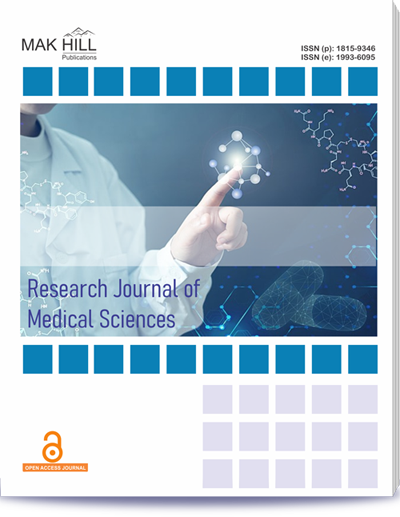
Research Journal of Medical Sciences
ISSN: Online 1993-6095ISSN: Print 1815-9346
Abstract
The human gut microbiota has been increasingly recognized for its significant impact on overall health, including cardiovascular function. This study aims to elucidate the relationship between specific gut microbiota compositions and various cardiovascular parameters in healthy adults. This study involved a cross‐sectional analysis of healthy adult participants. The composition of gut microbiota was quantified using sequencing methods, focusing on key microbial strains and diversity. Cardiovascular parameters assessed included systolic and diastolic blood pressure, heart rate variability (HRV), arterial stiffness (measured by tonometer) and levels of Trimethylamine‐N‐oxide (TMAO). Statistical analyses were performed to determine the significance of associations between gut microbiota compositions and cardiovascular measures. Firmicutes/Bacteroidetes Ratio and Blood Pressure. Participants with Firmicutes/Bacteroidetes‐dominant microbiota exhibited significantly lower systolic (mean 112 mmHg, SD 9 mmHg) and diastolic blood pressure (mean 75 mmHg, SD 8 mmHg) compared to those with Proteobacteria dominance (systolic mean 122 mm Hg, SD 11 mmHg, diastolic 81 mm Hg, SD 10 mm Hg), with p‐values of 0.007 and 0.03, respectively. Heart Rate Variability and Microbial Strains Higher HRV was noted in participants with greater abundance of Faecalibacterium prausnitzii (>107,000 sequences/sample) and Roseburia (>116,000 sequences). The highest quartiles for these bacteria showed increased HRV compared to the lowest quartiles (p = 0.02 and p = 0.04, respectively). Gut Microbial Diversity and Arterial Stiffness. An inverse association was observed between gut microbial diversity and arterial stiffness. Higher diversity (>3.8 Shannon index) correlated with lower PWV (mean 5.1 m sG1), whereas lower diversity (<3.0 Shannon index) corresponded with higher PWV (mean 6.2 m sG1), p = 0.001. TMAO Levels and Bifidobacterium Abundance Elevated TMAO levels were associated with lower Bifidobacterium abundance (p = 0.005), with the lowest quartile showing mean TMAO levels of 8.5 μM compared to 6.1 μM in the highest quartile. The study highlights significant associations between gut microbiota composition and various cardiovascular health parameters. These findings suggest that the gut microbiome could play an essential role in cardiovascular health, offering potential avenues for therapeutic interventions.
How to cite this article:
G. Venkata Mahesh, K.P. Prasad Babu, P. Sumangali and K. Akshitha. Observing the impact of Gut Microbiota on Cardiovascular Function in Healthy Adults.
DOI: https://doi.org/10.36478/10.59218/makrjms.2023.8.170.174
URL: https://www.makhillpublications.co/view-article/1815-9346/10.59218/makrjms.2023.8.170.174